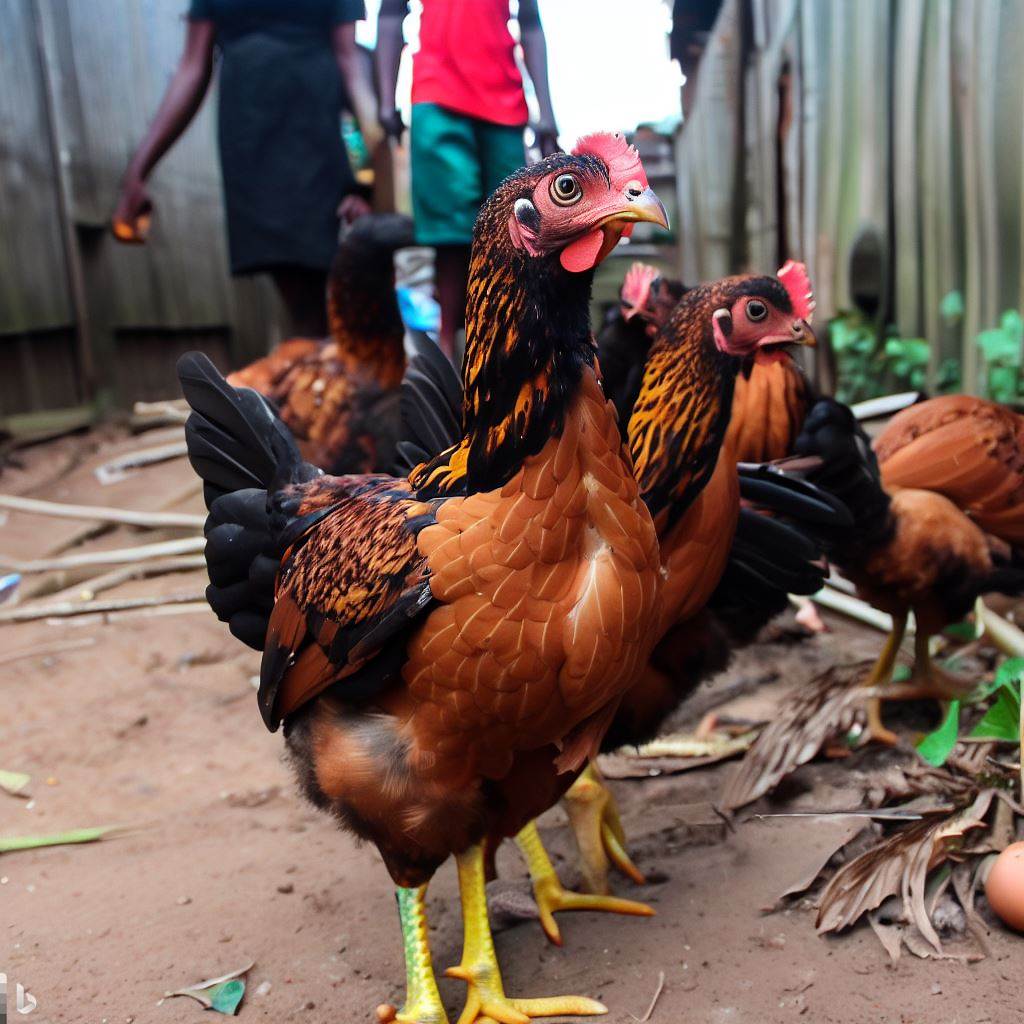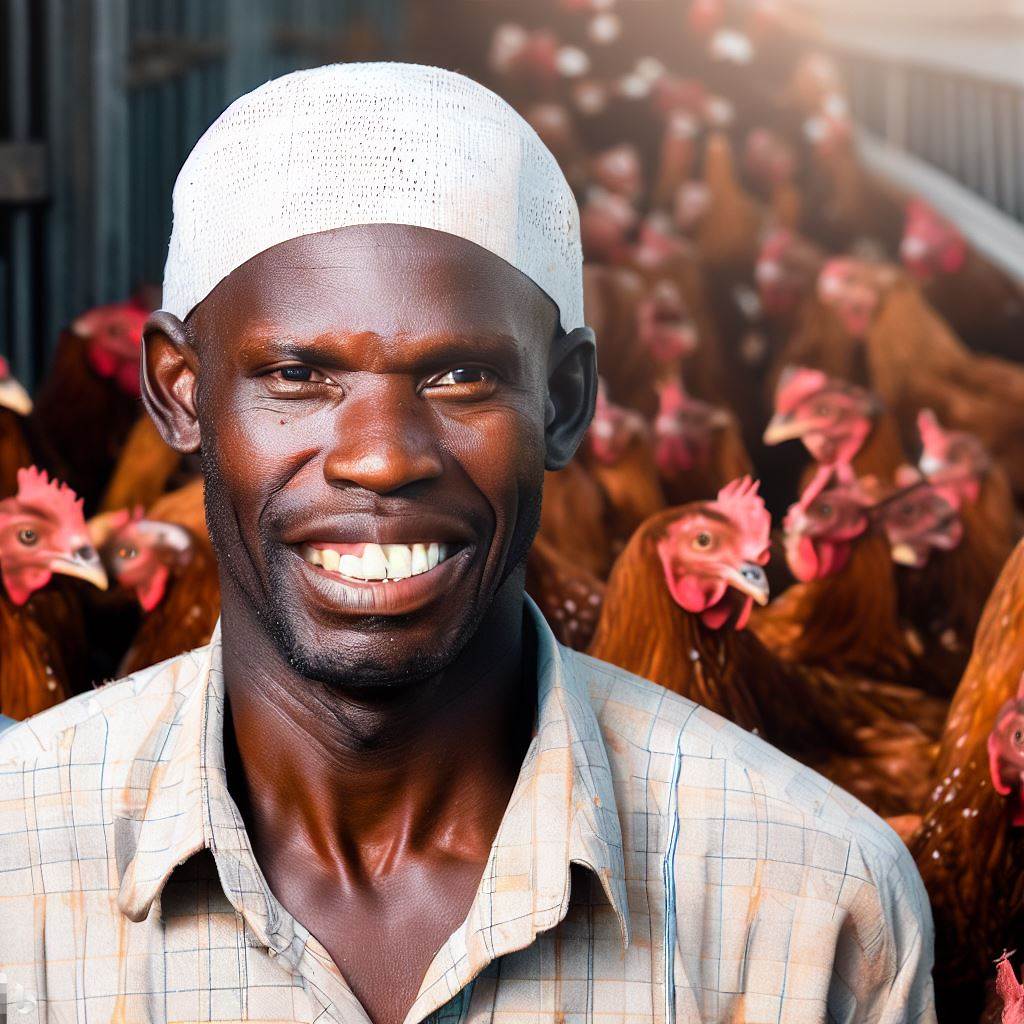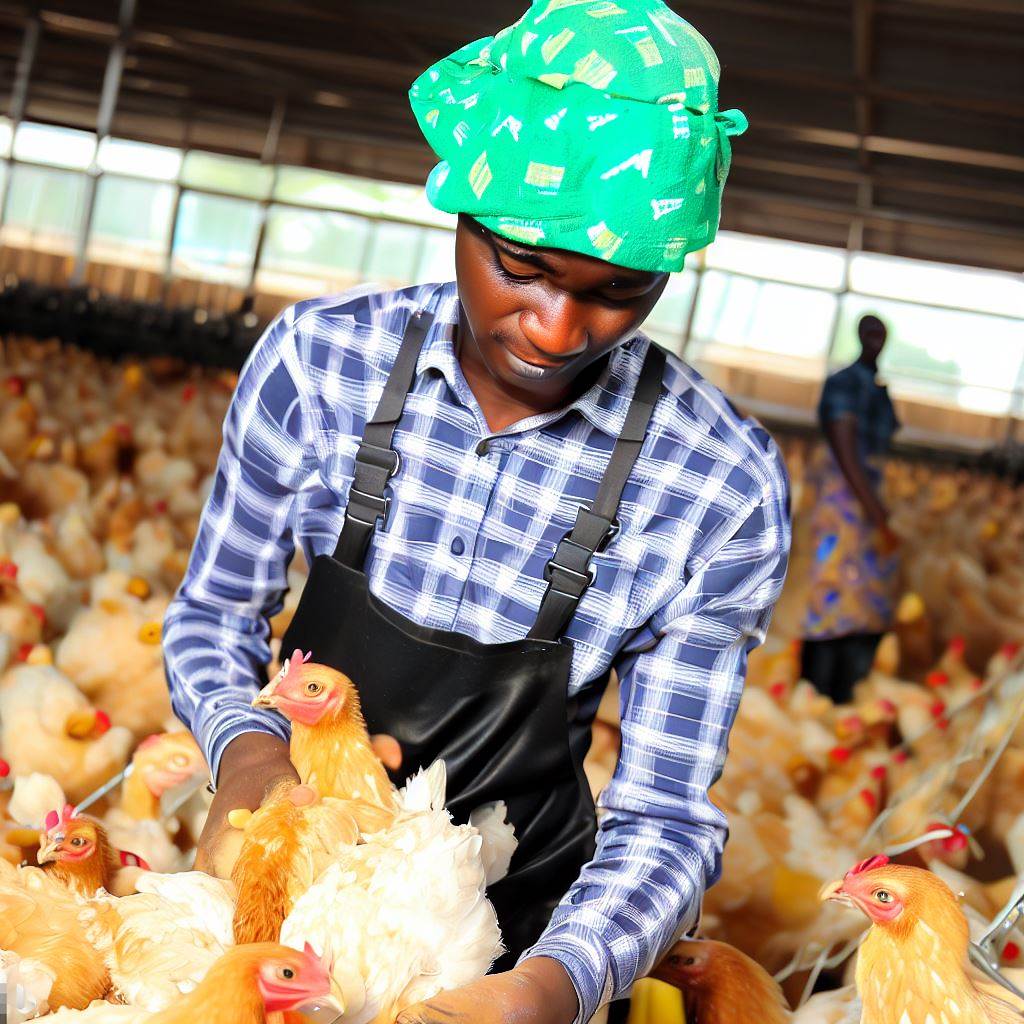Introduction
Local chicken breeds are crucial in poultry farming, providing numerous benefits to farmers in Nigeria.
Poultry farming in Nigeria is a widespread practice that plays a significant role in the country’s agriculture and economy.
Local chicken breeds are highly adaptable, hardy, and disease-resistant, making them ideal for small-scale poultry farming.
They can survive in diverse climatic conditions, including harsh environments with limited resources.
Not only do local chicken breeds require minimal investment, but they also provide nutritious meat and eggs.
This makes them a valuable source of food and income for local communities.
Additionally, local chicken breeds contribute to the preservation of biodiversity and cultural heritage.
They have been part of Nigerian traditions and rituals for generations, reflecting the country’s rich cultural diversity.
Poultry farming is a prominent agricultural sector in Nigeria, providing employment opportunities and contributing to food security.
It involves the rearing of chickens for meat and egg production, helping to meet the country’s high demand for poultry products.
The local chicken breeds in Nigeria include the Fulani, Yoruba, and Nera breeds, among others.
These breeds have unique traits and characteristics that make them suitable for various farming systems and market preferences.
In short, local chicken breeds play a vital role in poultry farming in Nigeria.
They offer numerous advantages, including adaptability, resilience, affordability, and cultural significance.
Investing in these breeds not only benefits farmers but also contributes to the overall development of the Nigerian poultry industry.
Advantages of Local Chicken Breeds
Local chicken breeds offer several advantages that make them a suitable choice for poultry farming in Nigeria.
These advantages include their adaptability to the local climate and environment, their resistance to diseases and pests, their high fertility and hatchability rates, and their ability to forage for food.
1. Adaptability to local climate and environment
Local chicken breeds have developed over time to adapt to the specific climate and environment of Nigeria.
They can better withstand the heat, humidity, and other prevailing weather conditions in the region.
This makes them well-suited to local farming practices and reduces the risk of heat stress and other climate-related issues.
2. Resistance to diseases and pests
One of the major benefits of local chicken breeds is their natural resistance to common poultry diseases and pests.
They have evolved to cope with local pathogens and parasites, making them more robust and less susceptible to illness.
This reduces the need for expensive medications and treatments, resulting in lower healthcare costs for farmers.
3. High fertility and hatchability rates
Local chicken breeds are known for their excellent reproductive abilities.
They exhibit a high fertility rate, meaning they can produce a large number of fertilized eggs.
Additionally, these eggs have a high hatchability rate, resulting in a higher number of healthy chicks.
This reproductive advantage can significantly increase the overall productivity and profitability of poultry farming operations.
4. Ability to forage for food
Unlike some commercial chicken breeds, local chicken breeds have retained their natural ability to forage for food.
They are excellent scavengers and can find a significant portion of their nutritional needs from the natural environment, including insects, worms, and vegetation.
This ability to self-source their food reduces the reliance on expensive commercial feeds, making local chicken breeds a more economical choice for farmers.
In short, local chicken breeds offer several advantages that make them a preferred choice for poultry farming in Nigeria.
Their adaptability to the local climate and environment, resistance to diseases and pests, high fertility and hatchability rates, and ability to forage for food make them well-suited for sustainable and cost-effective poultry production.
By leveraging these advantages, farmers can maximize their profitability and contribute to the growth of the poultry industry in Nigeria.
Read: Impact of Government Policies on Poultry Production in Nigeria
Popular Local Chicken Breeds in Nigeria
Nigerian Indigenous Chicken (NIC)
- Characteristics: The NIC is a small to medium-sized chicken breed with various color patterns.
- Benefits of rearing NIC: NICs are well adapted to the Nigerian climate, resistant to diseases, and have high fertility rates.
Fulani Chickens
- Characteristics: Fulani chickens are medium-sized with beautiful feathers and come in different colors.
- Benefits of rearing Fulani chickens: These chickens are highly resistant to harsh weather, diseases, and pests.
Yoruba Chicken
- Characteristics: Yoruba chickens are large-sized with attractive feather patterns.
- Benefits of rearing Yoruba chickens: Yoruba chickens are known for their high egg production and meat quality.
Nigeria hosts diverse agriculture, fostering various native chicken breeds suitable for poultry farming.
These breeds, well-adapted to local conditions, include the Nigerian Indigenous Chicken (NIC), Fulani Chickens, and Yoruba Chicken.
The NIC, a resilient small to medium-sized breed, thrives in Nigeria’s climate and exhibits natural disease resistance.
Fulani Chickens, linked to the Fulani ethnic group, are prized for weather resilience, diverse colors, and excellent meat quality.
Yoruba Chicken, from the Yoruba ethnic group, excels in egg production and tender, flavorful meat.
Raising these breeds offers advantages: climate adaptability curbs weather-related losses, minimal management reduces disease risk, and their suitability for free-range systems aligns with traditional practices.
Promoting these breeds preserves local poultry genetics.
Amidst exotic breed dominance, emphasizing their role safeguards these breeds, fostering sustainable poultry farming.
In Nigeria, native breeds like NIC, Fulani Chickens, and Yoruba Chickens not only support poultry farming but also conserve the nation’s poultry genetic heritage.
Read: Emerging Trends in the Nigerian Poultry Production Sector

Tips for Starting a Poultry Farm with Local Chicken Breeds
Starting a poultry farm with local chicken breeds in Nigeria can be a lucrative venture.
However, it requires careful planning and implementation. Here are some essential tips for success:
1. Selection of chicken breed
- Choose local chicken breeds that are well-suited for your region’s climate and conditions.
- Consider the purpose of your poultry farm, whether it’s for meat, eggs, or both.
- Research the characteristics and performance of different local chicken breeds.
- Select breeds are known for their growth rate, disease resistance, and market demand.
2. Provision of suitable housing and ventilation
- Ensure adequate space in the chicken coop or housing to prevent overcrowding.
- Provide proper ventilation to maintain good air quality and prevent respiratory diseases.
- Keep the housing clean and dry, avoiding dampness and excessive moisture.
- Install appropriate lighting to regulate the chickens’ day-night cycles.
3. Nutrition and feeding requirements
- Consult a poultry nutritionist to develop a balanced diet for your local chicken breeds.
- Provide access to clean and fresh water at all times.
- Include a mix of grains, protein sources, vitamins, and minerals in their feed.
- Supplement their diet with greens, vegetables, and kitchen scraps for added nutrition.
4. Vaccinations and disease prevention
- Work closely with a veterinarian to develop a vaccination schedule for your chickens.
- Protect your local chicken breeds against common poultry diseases prevalent in your area.
- Implement biosecurity measures to prevent the introduction and spread of diseases.
- Regularly monitor and inspect your flock for any signs of illness or parasites.
5. Marketing and selling local chicken products
- Identify your target market and cater to their preferences.
- Promote your local chicken products through online platforms, local markets, and word-of-mouth.
- Adopt modern packaging and labeling methods to attract customers.
- Maintain consistent product quality and deliver excellent customer service.
Starting a poultry farm with local chicken breeds can be a rewarding venture if done right.
By following these tips, you can increase your chances of success and profitability.
Remember, consistent care, proper management, and market awareness are keys to thriving in the poultry farming industry.
Read: The Economics of Poultry Production in Nigeria
Delve into the Subject: Nigeria’s Agricultural Extension Services: Career Scope
Success Stories of Local Chicken Farms in Nigeria
Stories of successful poultry farms
Poultry farming has become a thriving business in Nigeria, with many local chicken farms achieving remarkable success.
Here are some inspiring stories of poultry farmers who have made it big in the industry:
1. Mr. Johnson’s Poultry Farm
- Started with just 100 local chickens.
- Implemented proper housing and hygiene practices.
- Regularly vaccinated and provided quality feed to the chickens.
- Gradually expanded the farm and now has 5,000 chickens.
- His success can be attributed to dedication, hard work, and attention to detail.
2. Mrs. Ahmed’s Organic Poultry Farm
- Focused on organic practices and promoted chemical-free chicken products.
- Established a direct link with health-conscious consumers.
- Highlighted the benefits of organic chicken, attracting a niche market.
- Gained popularity and expanded the farm rapidly.
- The success of Mrs. Ahmed’s farm highlights the importance of meeting consumer demands.
3. Mr. Abubakar’s Free-Range Poultry Farm
- Allowed chickens to roam freely and forage for food.
- Marketed his farm as environmentally friendly and cruelty-free.
- Educated consumers about the benefits of free-range chicken.
- Developed a loyal customer base seeking ethically raised poultry.
- Mr. Abubakar’s farm exemplifies the rising demand for sustainable and humane products.
Factors contributing to their success
1. Market Research
- Understanding consumer preferences and demands.
- Identifying gaps in the market and capitalizing on them.
- Offering unique products or services to stand out from the competition.
2. Quality Management
- Maintaining high standards in chicken housing, hygiene, and health.
- Regular vaccinations to prevent diseases and ensure optimal growth.
- Providing nutritious feed and clean water to keep the chickens healthy.
3. Marketing Strategies
- Effectively promoting their farms through various channels.
- Utilizing social media platforms to reach a wider audience.
- Collaborating with local restaurants, supermarkets, or caterers to increase sales.
Lessons to learn from their experiences
1. Adapt to Market Trends
- Stay updated with the latest poultry farming techniques and consumer preferences.
- Modify farming practices to align with market demands and optimize profits.
2. Focus on Quality
- Strive to produce healthy, disease-free chickens by maintaining proper hygiene.
- Invest in high-quality feed and ensure the chickens have access to clean water.
- Implement vaccination programs to prevent diseases and increase productivity.
3. Build a Strong Brand
- Differentiate your farm from competitors by offering unique products or services.
- Develop a strong online presence and engage with customers through social media.
- Establish your farm as a trusted and reliable source of quality poultry products.
In fact, the success stories of local chicken farms in Nigeria prove that with dedication, hard work, and innovative strategies, anyone can achieve remarkable success in poultry farming.
By understanding market demands, ensuring quality, and building a strong brand, aspiring poultry farmers can learn valuable lessons to thrive in the industry.
Read: Guide to Starting a Poultry Farm in Nigeria: Steps & Tips
Conclusion
Local chicken breeds play a crucial role in poultry farming in Nigeria.
They offer numerous advantages such as adaptability, resistance to diseases, and better taste.
By utilizing local chicken breeds, farmers can contribute to the local economy and increase food security.
Therefore, it is highly encouraged for individuals to venture into poultry farming using local chicken breeds in Nigeria.
This not only benefits the farmers economically but also promotes sustainable agriculture and supports local communities.
Choosing local chicken breeds is a wise investment that can lead to long-term success in the poultry farming industry.




